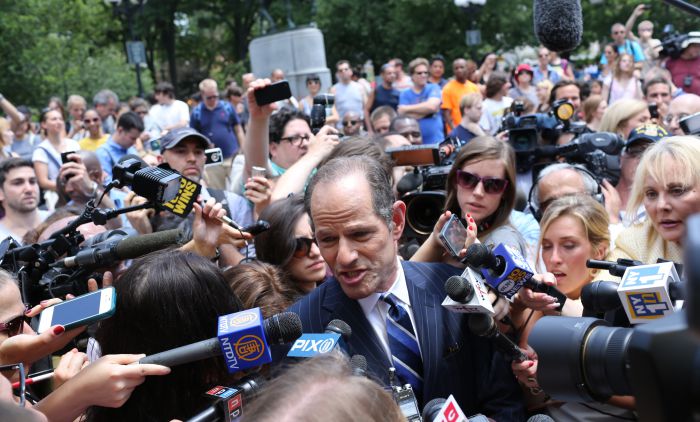In a special interview with ProMarket, former New York governor Eliot Spitzer talks about financial regulation, regulatory capture, and antitrust. Part 1 of 2.
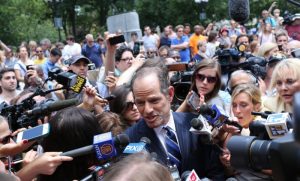
Clear rules and their enforcement are essential tenets of democracy and a free market economy. Some critics have raised the question of whether law enforcement institutions in the U.S. have the will and the ability to hold the most powerful actors in corporate America to account. With this question in mind, we recently sat down for an interview with Eliot Spitzer, the former governor of New York.
Spitzer, who served as the New York Attorney General prior to becoming governor, is a member of a growing group of vocal public figures who raise concerns over economic concentration, inequality, business ethics, corporate culture, regulatory capture, and the scaling back of regulations. Spitzer, who was forced to resign from his position as governor in 2008 and did not succeed in his bid to become New York City’s comptroller in 2013, has mostly left public life and now focuses on running the real estate group he inherited from his father.
We will publish this interview in two parts (update: read the second part here), with the first part focusing on financial regulation and regulatory capture.
Guy Rolnik: The last time we sat down for an interview was in 2011, right after the Occupy Wall Street protests began and the growing discontent of many Americans with the financial system came into prominence. What has changed since then?
Eliot Spitzer: Wall Street is different today than it was either in 2008 or 1998. It’s more concentrated in terms of the too big to fail banks. Now, one can have a conversation [on whether] that issue has been confronted with Dodd-Frank or not.
There’s greater concentration, but I also think there has been some positive movement in terms of capital requirements and de-risking their portfolios, because some of the most toxic derivatives and lending practices have been eliminated.
There’s also a reality, which is that the next crisis is never quite like the last one, and so while we may have dealt with derivatives, and we may have dealt with certain elements of subprime lending, what’s going to blow up next is something we’re not thinking about right now.
GR: I’m reading Jesse Eisinger’s book, The Chickenshit Club. Eisinger, who was a guest here at the Stigler Center last year, argues that in the last 15 years or so the U.S. has “lost the will and the ability” to pursue white collar criminal investigations and indictments when it comes to the CEOs of large firms. Do you share this view?
ES: I’m not sure we lost it, because I don’t think we ever had it.
GR: And if I had asked you that 15 years ago, when you were New York’s Attorney General?
ES: I don’t want to sit down and toot my own horn and say that we did some useful and important stuff, but I think that, by and large, there has been a failure. The S&L crisis might be the exception. There has been a failure to rigorously oppose the obligations of ethical banking throughout the system on a regular basis.
That continues to be the case, because it is difficult. Look at the continuing scandals that are pouring out of Wells Fargo, with the most recent headlines about their having sold car insurance to people without any rationale, whatsoever.
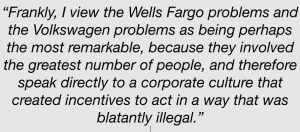 Frankly, I view the Wells Fargo problems and the Volkswagen problems as being perhaps the most remarkable, because they involved the greatest number of people, and therefore speak directly to a corporate culture that created incentives to act in a way that was blatantly illegal.
Frankly, I view the Wells Fargo problems and the Volkswagen problems as being perhaps the most remarkable, because they involved the greatest number of people, and therefore speak directly to a corporate culture that created incentives to act in a way that was blatantly illegal.
In other conspiracies, like the Libor conspiracy, the criminal acts arose among a limited number of people who saw the opportunity to garner significant upside, they thought, in a way that won’t be detected. What is remarkable this time is that you have that many people involved, and you say, “how could that possibly have happened?” That’s why the Wells Fargo saga, both round one, with the false accounts, and then round two, with the auto insurance, and Volkswagen surreptitiously avoiding the emissions detection, are absolutely staggering to me in terms of the scope of the conspiracy.
Even if there was a significant desire in the immediate aftermath of 2008 to do something—and Dodd-Frank did something—now the pendulum has swung back the other way with the new leadership at the Securities and Exchange Commission (SEC) and the Office of the Comptroller of the Currency (OCC) affirmatively saying, “We want to roll back those obligations (the few obligations that were imposed) and become more lenient,” because they believe that these obligations were stifling economic activity, which I honestly don’t think is the case.
GR: You mentioned the actions taken by the current administration, but before that there were eight years of the Obama administration, and Democrats have been in power for 16 of the last 24 years.
ES: I say none of this to suggest that the Justice Department under Eric Holder should be held out as an example. Just the opposite. [Former Assistant Attorney General for the Criminal Division of the Department of Justice] Lanny Breuer’s articulation of “too big to prosecute“ goes down as, on the one hand, the most honest and also the most disturbing statement made by the head of the Criminal Division in the Justice Department.
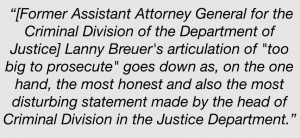
It would frankly have been more understandable for the Treasury Secretary to say, “Guys, we consider these are the implications.” But for the head of the Criminal Division to basically give carte blanche by saying, “You’re too big to prosecute,” was mind-boggling.
GR: With the exception of the S&L scandal that you mentioned, when was the last time that the U.S. did have the ability to hold the most powerful in the business sector to account?
ES: I’m not sure we ever did. There really wasn’t that level of culpability.
Let me make one other point about the Obama Justice Department. When there was enormous pressure brought to bear on that Justice Department, I would say in probably 2012 and 2013 or maybe after, to do something, the answer was what I call round two of OPM. Round one of OPM is what led to the scandal. That’s when the crisis started. Round two was CEOs using shareholder money to pay huge fines in settlements that permitted the Justice Department to say, “Look [at] what we’re doing, we’ve done something.” Really, it’s just shareholder money being transferred to various other parties without the culpable individuals ever being held accountable.
GR: Some people say that they are robbing the shareholders twice: once when they’re committing the fraud and then when they’re paying for the settlement.
ES: Precisely.
GR: If there was never a golden age of enforcement, isn’t the result of that lack of law enforcement now more vivid and also more harmful, because of issues such as rising inequality and corruption?
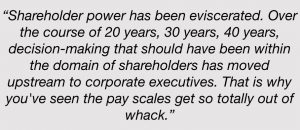 ES: Shareholder power has been eviscerated. Over the course of 20 years, 30 years, 40 years, decision-making that should have been within the domain of shareholders has moved upstream to corporate executives. That is why you’ve seen the pay scales get so totally out of whack.
ES: Shareholder power has been eviscerated. Over the course of 20 years, 30 years, 40 years, decision-making that should have been within the domain of shareholders has moved upstream to corporate executives. That is why you’ve seen the pay scales get so totally out of whack.
It is hard to imagine that if we didn’t have these interlocking consultants and compensation committees and shareholders who are disempowered, that we would have gotten to the point where CEOs would be compensated as they are and as they have been.
What we need to think about is some form of strict liability for CEOs who oversee companies involved in structural fraud. Then, somebody will say, “How can you say to a CEO who didn’t actually know that something was going on, that he should lose his job or her job because stuff is going on inside the company?”
The answer is we need to create an incentive system that links CEO behavior to the behavior of the employees in the company. We haven’t seen that. I’ve said, at the time of the crisis in ’08, it would have been not only appropriate but, I think, smart, for the Justice Department to say, “We’re bailing you out”—which I thought was necessary, you couldn’t let the system collapse—“but the CEOs of these multiple companies are going to lose [their] jobs and everybody from X level up is going to have bonuses clawed back.” All of that should have been a prerequisite to the grant of the bailouts.
The CEOs would have been in a difficult position because they couldn’t have balked at that without violating their fiduciary duty to the shareholders because, had they done so, they would have been putting their own interest above.
Take Wells Fargo. At least in round one, they did get rid of the CEO when the account creation scandal broke.
GR: Wasn’t that only after the political pressure put on them following Elizabeth Warren’s questioning of [Wells Fargo CEO] John Stumpf during the Senate Banking Committee hearing? It doesn’t seem that he was about to step down before that.
ES: Correct. It only happened after some Senate hearings and enormously adverse pressure.
GR: It was also only after learning that Wells Fargo’s board commissioned a report that said that, actually, the company knew all about these issues for years. And only after that, the regulator came out and said it has also known about it for eight years.
ES: That case will go down as a case study, because the Los Angeles Times story came out four years earlier. It is staggering when you say, “Wait a minute, you knew this was going on for four years?” It’s a breathtaking example of failure to respond to known facts.
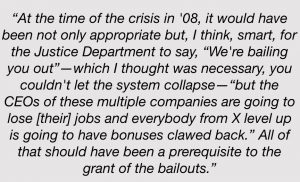
GR: When we’re talking about Wells Fargo, we are not talking about the fraud of a few executives, but rather a fraudulent culture that extends to many actors.
ES: Banking returns exploded during the era of the last 15 or 20 years in a way that should make people realize that something’s wrong. It’s clear.
I’m a big fan of banks that run properly. I’m a big fan of financial services—that is the bloodstream of the economy. But when the return on capital reaches that order of magnitude, you know that risks are being taken and business models are being stretched.
There’s a reason that banking, throughout history, has gotten a very nice, steady, low, single-digit return, in real dollars, real inflation-adjusted numbers. That’s what it should get if it’s doing its proper job. When you’re doing a whole lot higher than that, you’re beginning to do things that aren’t smart for the economy.
GR: Perhaps not only in banking. There is a view that the U.S. regulation often benefits incumbents and thwarts competition. One area of the business sector where we see more and more concentration is among digital platforms.
ES: I point to at least two other factors, which are related. One is, yes, Facebook, Amazon, Google are so powerful because of a reality where technology has permitted concentration in certain new business models that have completely dominated their sector.
Let me drop a footnote here: antitrust theory and technology don’t intersect very well. Having been an antitrust lawyer for a bunch of years, I can tell you that—even if you just take the Microsoft case, when I was attorney general—by the time the courts can adjudicate a complicated antitrust issue in the field of technology, the technology has probably moved to a point where the resolution of the case is irrelevant.
If you think about it, what we were fighting over with Microsoft really isn’t an issue anymore, because it’s dealing with the technology of 15 or 20 years ago. We don’t know how to solve that problem, and frankly, when technology permits something to be done differently, you’re probably going to get one or two companies initially that dominate it. We have to figure out how to confront that issue.
Let’s come back to the distributive issue that you were talking about before, which is about wealth. The other reality is that the entire balance between capital and labor has shifted, and labor has been on the losing side of that in the last 20 years. That is a consequence of globalization and technology.
Labor has been commoditized, and with the capacity to move capital around the world, primarily in manufacturing, the gains that were made by workers in many industrial sectors have disappeared or have dissipated.
Is that beginning to change a little bit for certain sectors of skilled labor? Yes. But as long as capital is as mobile as it is today, and labor is as commoditized as it has become, the distributive issue is going to be persistent.
(Note: this is the first part of our two-part interview with Eliot Spitzer. Part 2 will appear in the next few days.)
Disclaimer: The ProMarket blog is dedicated to discussing how competition tends to be subverted by special interests. The posts represent the opinions of their writers, not those of the University of Chicago, the Booth School of Business, or its faculty. For more information, please visit ProMarket Blog Policy.





